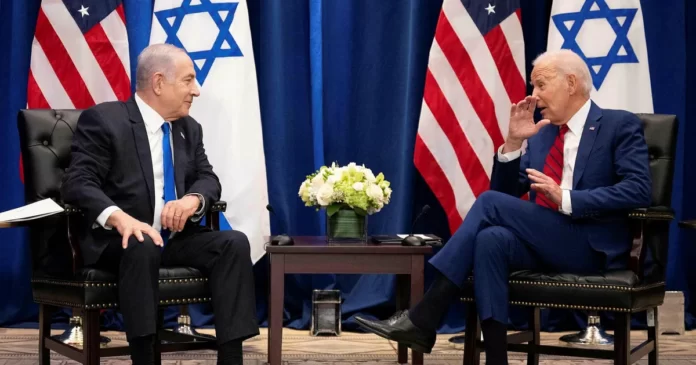Israeli Prime Minister Benjamin Netanyahu’s sharp rebuke of US President Joe Biden’s condemnation of Israeli settlers has ignited a diplomatic firestorm, exposing underlying tensions between the two allies. Netanyahu’s criticism comes amid escalating tensions in the Israeli-Palestinian conflict, underscoring the complexities of US-Israel relations and the challenges of navigating divergent interests in the Middle East.
The rift between Netanyahu and Biden surfaced following the Biden administration’s condemnation of Israel’s plan to construct new settler homes in the occupied West Bank. The US State Department criticized the move, labeling it as “unhelpful” to the prospects of a two-state solution and urging Israel to refrain from actions that undermine peace efforts in the region. In response, Netanyahu lashed out at Biden’s administration, accusing it of adopting a “double standard” and interfering in Israel’s internal affairs.
Netanyahu’s condemnation of Biden’s stance reflects longstanding tensions between Israeli leaders and US administrations over the issue of Israeli settlements in the occupied territories. Israeli settlements in the West Bank and East Jerusalem, which are considered illegal under international law, have been a major point of contention in the Israeli-Palestinian conflict, complicating efforts to reach a negotiated peace agreement.
For Netanyahu and his right-wing coalition, the construction of settlements is viewed as a strategic imperative and a symbol of Israel’s sovereignty over the disputed territories. Netanyahu’s government has consistently supported the expansion of settlements, arguing that they are vital for Israel’s security and fulfill the aspirations of Jewish communities to live in their ancestral homeland. However, critics argue that the continued expansion of settlements undermines the prospects of a viable Palestinian state and perpetuates the cycle of violence and instability in the region.
The Biden administration’s condemnation of Israeli settlements reflects a departure from the policies of the previous Trump administration, which took a more lenient approach towards Israeli settlement activity. President Biden has expressed his commitment to a two-state solution to the Israeli-Palestinian conflict, signaling a willingness to engage in diplomacy and multilateral efforts to advance peace and stability in the region. However, Biden’s stance has faced pushback from Israeli leaders like Netanyahu, who view it as overly critical and out of step with Israel’s security interests.
The rift between Netanyahu and Biden underscores the complexities of US-Israel relations and the challenges of balancing strategic alliances with divergent policy priorities. Israel has long relied on US support, both diplomatically and militarily, as a crucial ally in the Middle East. The United States, in turn, has viewed Israel as a key partner in promoting stability and security in the region, particularly in the face of shared threats such as Iran’s nuclear ambitions and Islamist extremism.
However, disagreements over issues such as Israeli settlements, the Iran nuclear deal, and the Israeli-Palestinian peace process have strained the relationship between the two countries at times. The Biden administration’s efforts to recalibrate US policy towards Israel, while maintaining its commitment to the security and prosperity of the Jewish state, have met with resistance from Netanyahu’s government, which is wary of any perceived concessions or pressure to alter its policies.
The rift between Netanyahu and Biden also reflects broader shifts in US foreign policy towards the Middle East under the new administration. President Biden has sought to reengage with traditional allies and multilateral institutions, signaling a departure from the unilateralism and isolationism of the Trump era. This approach has implications for US-Israel relations, as Biden seeks to strike a balance between supporting Israel’s security needs and promoting a more inclusive and constructive approach to regional diplomacy.
In addition, Netanyahu’s criticism of Biden’s condemnation of Israeli settlers highlights the complexities of US-Israel relations and the challenges of navigating divergent interests in the Middle East. The rift between the two leaders underscores the need for constructive dialogue and diplomacy to address the underlying issues in the Israeli-Palestinian conflict and advance the cause of peace and stability in the region. As both leaders grapple with the complexities of the Middle East, the future of US-Israel relations remains uncertain, with significant implications for regional dynamics and global security.

